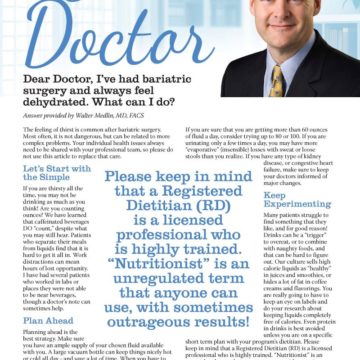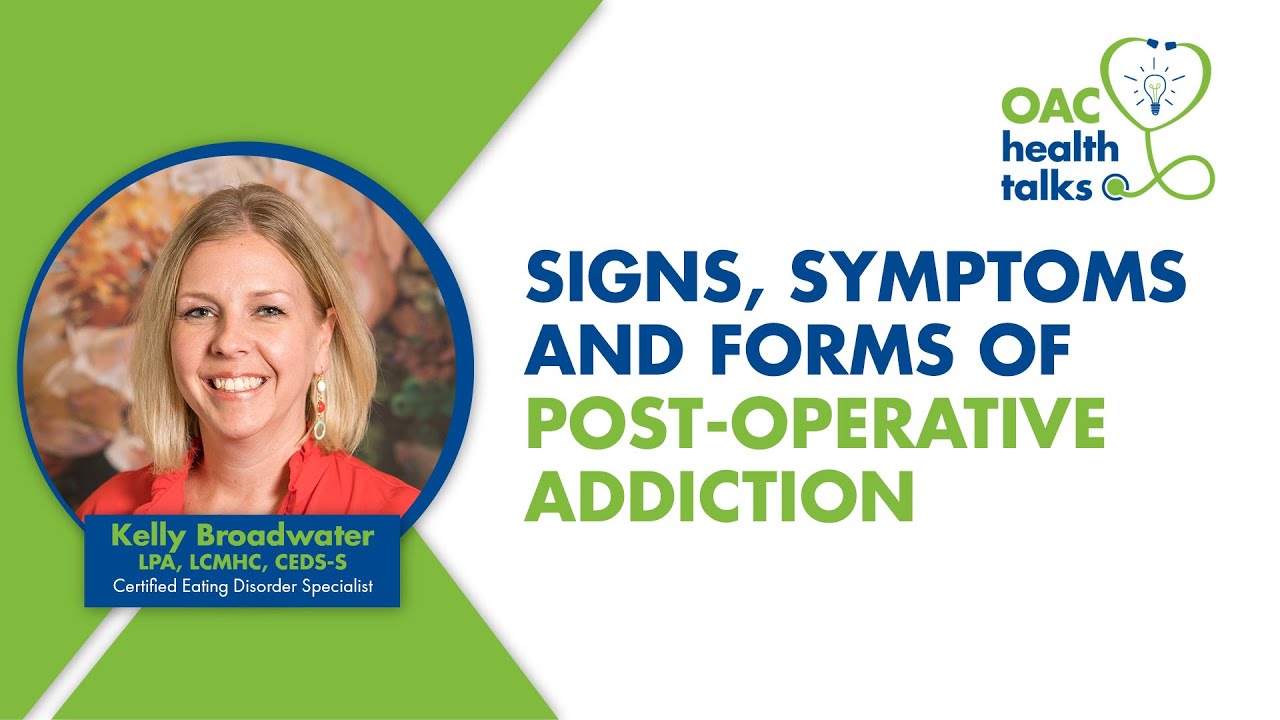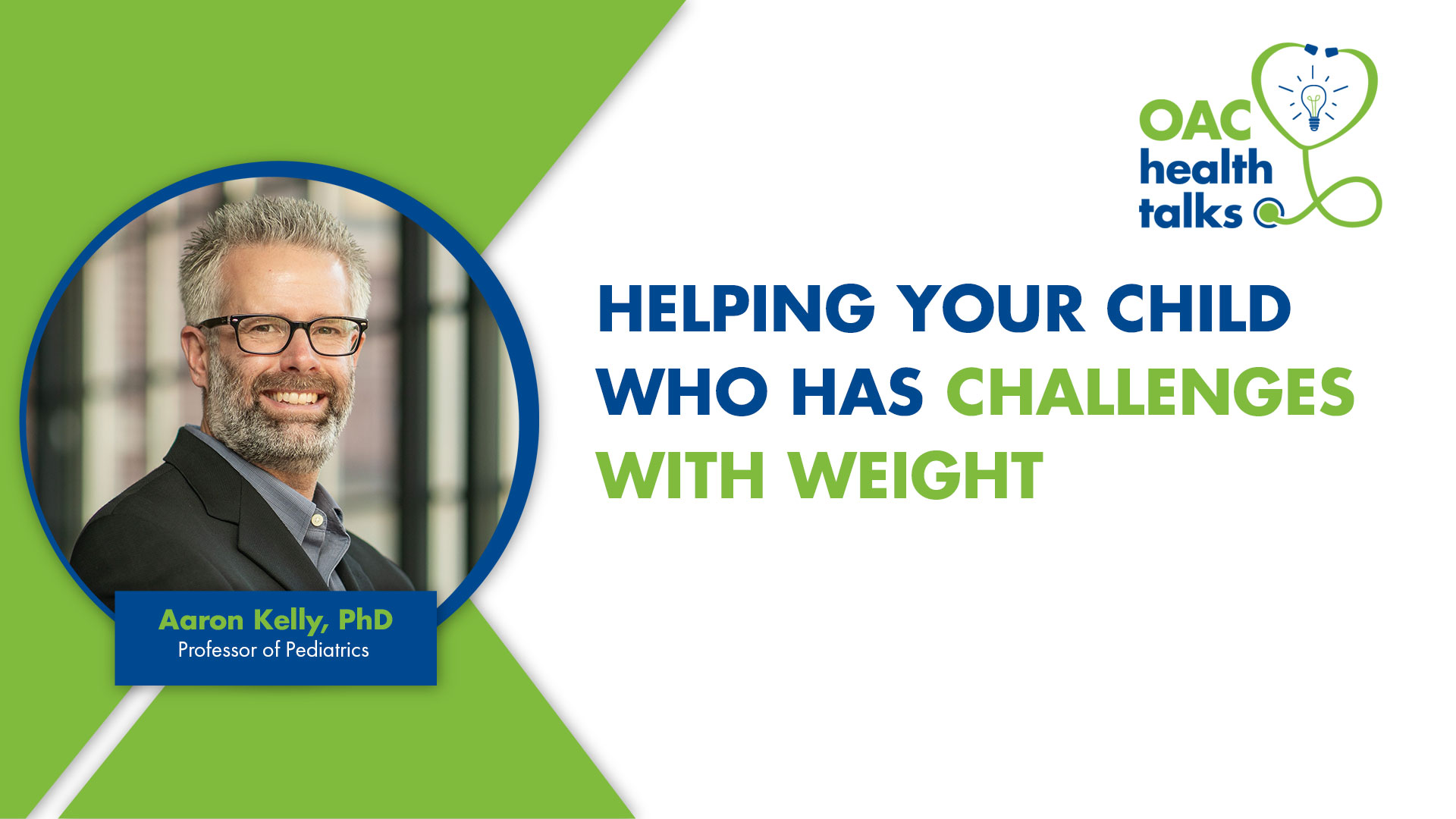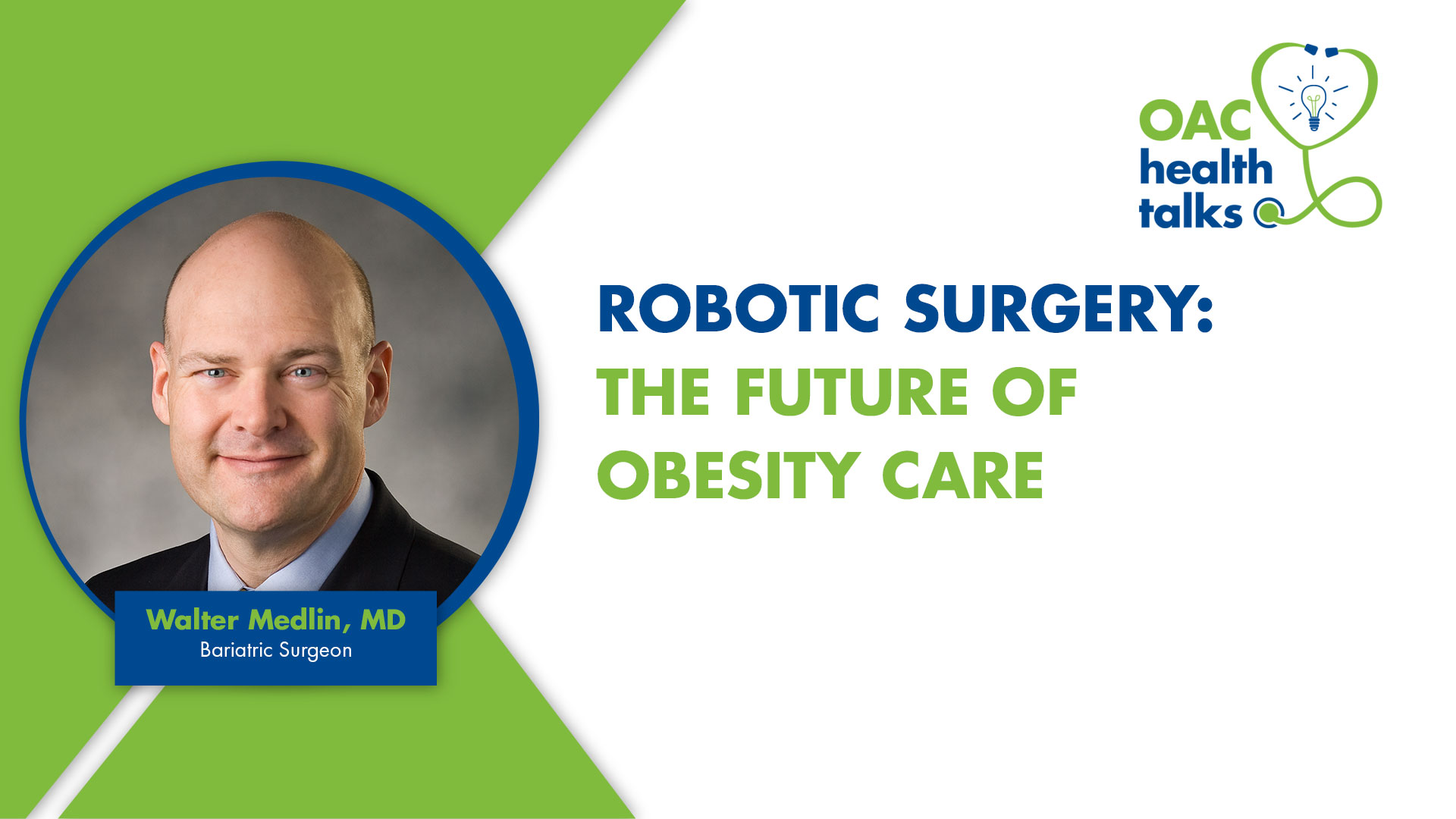American Board of Obesity Medicine – An inside Look

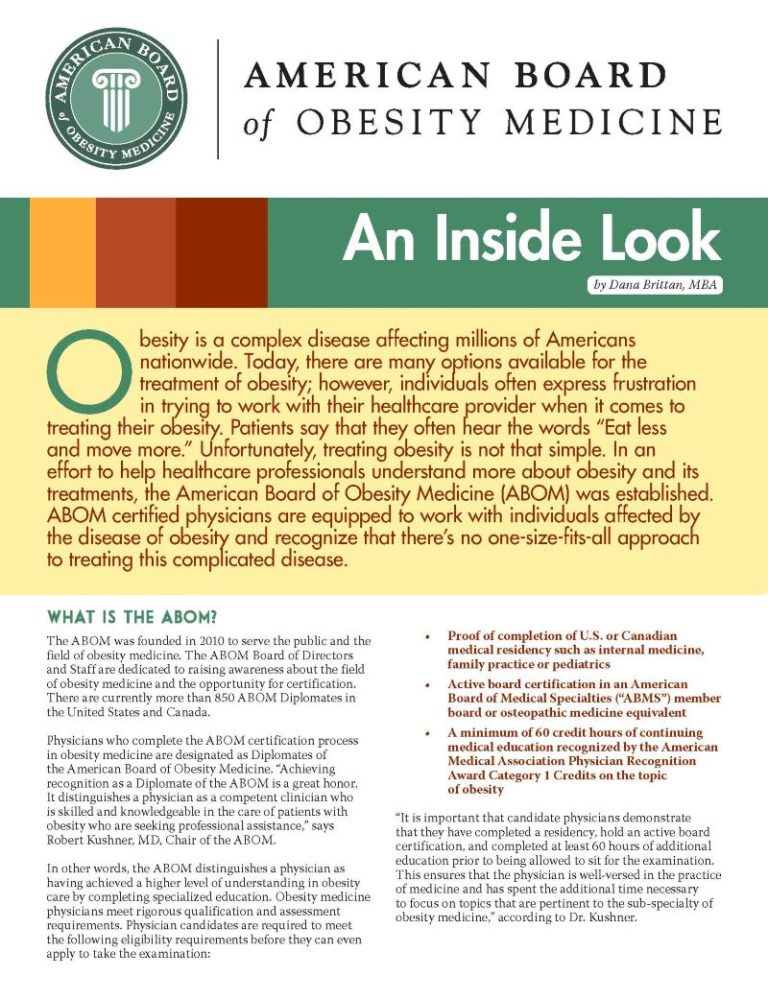
by Dana Brittan, MBA
Winter 2015
Obesity is a complex disease affecting millions of Americans nationwide. Today, there are many options available for the treatment of obesity; however, individuals often express frustration in trying to work with their healthcare provider when it comes to treating their obesity. Patients say that they often hear the words “Eat less and move more.” Unfortunately, treating obesity is not that simple. In an effort to help healthcare professionals understand more about obesity and its treatments, the American Board of Obesity Medicine (ABOM) was established. ABOM certified physicians are equipped to work with individuals affected by the disease of obesity and recognize that there’s no one-size-fits-all approach to treating this complicated disease.
What is the ABOM?
The ABOM was founded in 2010 to serve the public and the field of obesity medicine. The ABOM Board of Directors and Staff are dedicated to raising awareness about the field of obesity medicine and the opportunity for certification. There are currently more than 850 ABOM Diplomates in the United States and Canada.
Physicians who complete the ABOM certification process in obesity medicine are designated as Diplomates of the American Board of Obesity Medicine. “Achieving recognition as a Diplomate of the ABOM is a great honor. It distinguishes a physician as a competent clinician who is skilled and knowledgeable in the care of patients with obesity who are seeking professional assistance,” says Robert Kushner, MD, Chair of the ABOM.
In other words, the ABOM distinguishes a physician as having achieved a higher level of understanding in obesity care by completing specialized education. Obesity medicine physicians meet rigorous qualification and assessment requirements. Physician candidates are required to meet the following eligibility requirements before they can even apply to take the examination:
- Proof of completion of U.S. or Canadian medical residency such as internal medicine, family practice or pediatrics
- Active board certification in an American Board of Medical Specialties (“ABMS”) member board or osteopathic medicine equivalent
- A minimum of 60 credit hours of continuing medical education recognized by the American Medical Association Physician Recognition Award Category 1 Credits on the topic of obesity
“It is important that candidate physicians demonstrate that they have completed a residency, hold an active board certification, and completed at least 60 hours of additional education prior to being allowed to sit for the examination. This ensures that the physician is well-versed in the practice of medicine and has spent the additional time necessary to focus on topics that are pertinent to the sub-specialty of obesity medicine,” according to Dr. Kushner.
Once the board has determined that a physician candidate is eligible to take the examination, the physician candidate must then prepare for and pass the Certification Examination for Obesity Medicine Physicians. Approximately 70-75 percent of physician candidates pass the examination per year.
What is an Obesity Medicine Physician?
By definition, an obesity medicine physician is a clinician with expertise in the sub-specialty of obesity medicine. This requires competency in and a thorough understanding of the treatment of obesity and the genetic, biological, environmental, social, and behavioral factors that contribute to obesity.
The obesity medicine physician employs therapeutic interventions including:
- Diet
- Physical Activity
- Behavioral Change
- Pharmacotherapy
- and Bariatric Surgery
The obesity medicine physician also utilizes a comprehensive approach, and may include additional resources such as dietitians, exercise physiologists, psychologists and bariatric surgeons as indicated to achieve optimal results. Additionally, the obesity medicine physician can help pre and post-surgery bariatric patients with their care, advocate for those affected and work on obesity prevention as well.
How Does ABOM Work with Other Health-focused Organizations?
The ABOM aims to unify the field of obesity medicine under one certification process and to attract the support of as many meaningful partnering organizations as possible. The following societies and organizations are supporting partners with the ABOM and provide endorsement and educational activities to their respective members:
Primary Obesity CME Partners
- American Society of Bariatric Physicians
- Harvard Medical School Blackburn Course in Obesity Medicine
- Columbia University Institute of Human Nutrition
- The Obesity Society
Obesity-Related CME Partners
- American Society of Metabolic and Bariatric Surgery
- Canadian Obesity Network
- Cardiometabolic Health Congress
- Cardiometabolic Risk Summit
- Cleveland Clinic Obesity Summit
- Let’s Go
- Mayo: Nutrition & Wellness in Health & Disease
- USF: Making Sense of Treatment Guidelines for Obesity
- World Congress on Insulin Resistance, Diabetes & Cardiovascular Disease
American Board of Medical Specialties (ABMS) Fields of Medicine Partners
- American College of Physicians
- American College of Preventive Medicine
- American Congress of Obstetricians and Gynecologists
- American Gastroenterological Association
- The Endocrine Society
Public Health Partners
- American Society of Metabolic and Bariatric Surgery Foundation
- Obesity Action Coalition
- STOP Obesity Alliance
- The Obesity Treatment Foundation
Why is it Important for Your Physician to be ABOM Certified?
Obesity medicine physicians are committed to providing effective, evidence-based therapy for patients who are affected by excess weight or obesity. They recognize the need for a comprehensive approach that considers the multiple factors contributing to obesity including lifestyle, medical, pharmacological and surgical treatment options.
National studies have shown that obesity counseling rates remain low among healthcare professionals. The reasons vary and include time restraints during a busy practice, lack of effective treatment options and practical tools, low confidence or insufficient training in weight management skills and counseling, or concern that raising the topic will be interpreted by the patient as being insensitive. These factors suggest that there is a big gap between recommended obesity care and current physician practice.
An ABOM physician has been trained and is prepared to talk with you about your weight struggles. As the beginning of this article stated, “Obesity is a complex disease.” Through a strong patient-physician relationship, we can work with one another to address this nationwide epidemic and help individuals affected by the disease of obesity.
About the Author:
Dana Brittan, MBA, is the Executive Director of the American Board of Obesity Medicine. She completed her undergraduate degree at the University of Missouri-Columbia and her MBA at the University of Miami where she specialized in logistics and operations management.
ABOM FAQ
My current doctor/surgeon is not ABOM certified. Is this bad?
Just because your current doctor or surgeon is not ABOM certified does not mean they are unable to help you address your obesity. If you are comfortable with your physician and are addressing your weight in a proactive manner, we encourage you to continue working with your current doctor/surgeon. However, if you feel that your doctor is avoiding the conversation of weight, it may be best that you locate an ABOM doctor in your area.
Is it more expensive to see an ABOM certified doctor?
There shouldn’t be any difference in cost regardless if your doctor is ABOM certified or not. It’s best that you contact your insurance provider and confirm that the ABOM doctor is covered under your plan.
I have a hard time losing weight. Is it a guarantee that I’ll lose weight with an ABOM doctor?
Obesity is very complex, and this is why the ABOM was created to help train doctors in the field of obesity medicine. No doctor can guarantee weight-loss; however, an ABOM doctor is best qualified to help you in your weight-loss journey.
Do ABOM doctors use any type of medication or supplement for obesity?
ABOM doctors only use FDA-approved medications for the treatment of obesity.
If I go to an ABOM doctor, do I still have to see a dietitian and other healthcare professionals.
An ABOM physician is one piece to the healthcare puzzle. It is important that any weight-loss plan include a comprehensive team which may include a dietitian, psychologist, exercise physiologist and others.
If I had surgery, can an ABOM doctor still help me?
They will work in conjunction with your bariatric surgeon to help you manage your weight and improve your health. Think of an ABOM physician as another part of your healthcare team.
Does an ABOM Diplomate have knowledge of appropriate communication and issues related to weight bias, stigma, and discrimination?
Yes, these subjects are covered by the ABOM examination.
My bariatric surgeon is not ABOM certified. Does this mean they don’t know how to help me with my weight?
If your bariatric surgeon is not ABOM certified, that does not mean that they are not able to help you with your weight. ABOM certification is still fairly new, and your surgeon may not have had an opportunity yet to be certified. Continue working with your healthcare team and monitor your progress. You may even want to inquire with him/her regarding the ABOM and see if they plan on becoming certified in the future.
How long do I have to wait to see an ABOM certified physician?
Wait times to see an ABOM doctor will vary depending on availability. Use the ABOM’s Diplomate search function to locate an ABOM physician in your area and contact the physician for more information.
Post-operative addiction is often overly simplified as transfer addiction or cross-addiction, assuming individuals “trade” compulsive eating for…
View VideoIt can be challenging to find the right help for your child who has obesity. The first…
View VideoConsidering a robotic surgery procedure? In this Health Talk, you’ll hear from bariatric surgeon Walter Medlin, MD,…
View Video




